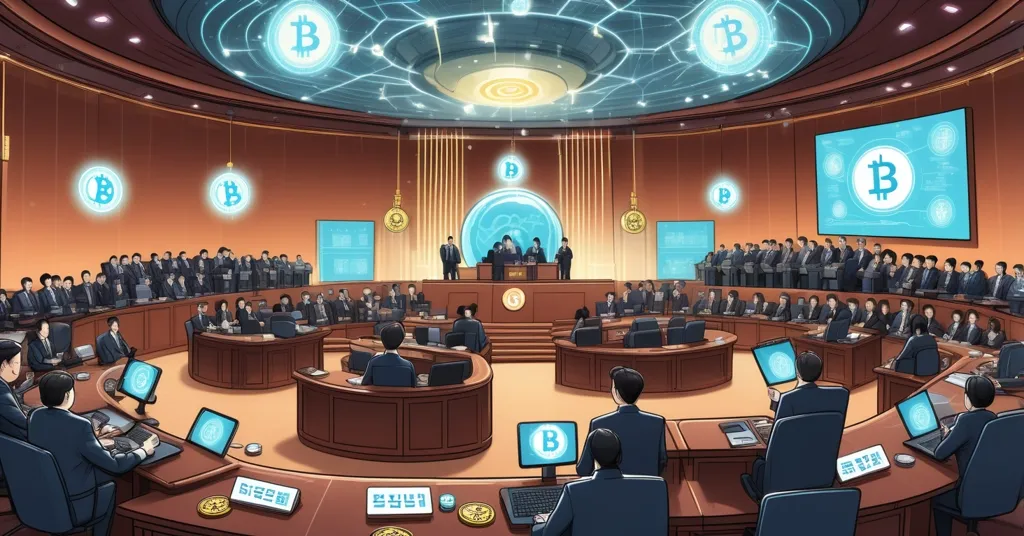South Korean Lawmakers Hold Bitcoin, XRP, PEPE Amid Crypto Deregulation Debate

South Korean Lawmakers HODL Bitcoin, XRP, and PEPE as Crypto Deregulation Looms
South Korea, a powerhouse in crypto adoption, is stirring up controversy with a recent investigation revealing that members of its National Assembly are personally invested in digital assets like Bitcoin (BTC), XRP, and even meme coins such as PEPE. As the nation’s leadership pushes for crypto-friendly reforms, these revelations spark heated debate over whether policymakers are championing innovation or padding their wallets.
- Energy Kyungjae probe reveals crypto holdings among National Assembly members.
- Investments span Bitcoin, XRP, PEPE, and niche tokens like Sandbox and Chiliz.
- Ethical concerns arise as President Lee Jae-myung drives pro-crypto deregulation.
Crypto Portfolios of South Korean Lawmakers Exposed
A deep dive by South Korean media outlet Energy Kyungjae into the asset declarations of the National Assembly’s Culture, Sports and Tourism Committee has uncovered a striking trend. Updated since March this year, these disclosures show that among the 16 committee members, many are betting big on cryptocurrencies and international tech stocks like Microsoft, NVIDIA, and Tesla, while largely snubbing the domestic stock market. This isn’t just a side hustle—it’s a bold statement in a country wrestling with how to regulate the very assets these politicians hold.
Leading the charge is Jin Jong-oh, a proportional representative from the opposition People Power Party. His portfolio includes 3,359 XRP (a high-cap altcoin linked to cross-border payments via Ripple), 8 XCORE (a lesser-known token with niche applications), and 214 Paycoin (a digital payment token tied to South Korean markets). The numbers are jaw-dropping: his crypto holdings have surged from $1,768 to $9,579 in mere months, quadrupling in value. This isn’t pocket change; it’s a glaring snapshot of crypto’s wild volatility and sky-high potential returns, raising questions about conflict of interest.
The plot thickens with family ties. Jin’s mother holds a staggering 3.2 billion PEPE coins—a meme coin born from internet culture, more akin to a digital gag than a serious asset, often compared to Dogecoin but with even less utility. She’s also diversified into Bitcoin, Chiliz (a token for sports fan engagement), and Sandbox (a metaverse platform where users build and monetize virtual worlds via blockchain). South Korean law mandates family asset disclosures to prevent hidden wealth, so these aren’t rumors—they’re hard facts on public record. It’s a sign of how crypto mania has gripped even those outside the political arena.
Across party lines, Yang Moon-seok of the ruling Democratic Party holds 452.6 XRP, valued at roughly $1,355. While his stack isn’t as flashy as Jin’s, it reinforces a bipartisan trend: lawmakers see crypto as more than a passing craze. Beyond digital coins, many also hold stakes in unlisted gaming firms like Xten Games and Memray, alongside US tech giants. Meanwhile, the domestic KOSPI market seems like an afterthought, a bitter pill given President Lee Jae-myung’s vision of a “KOSPI 5000 era” to rejuvenate local capital markets.
Policy Push Meets Personal Gain: An Ethical Quagmire
President Lee Jae-myung has made financial modernization a cornerstone of his administration, recently visiting the stock exchange to advocate for reforms like cracking down on share manipulation and tweaking taxes to boost dividends. His pro-crypto stance is equally ambitious, aiming to deregulate markets, promote stablecoin adoption, and fuel investment growth through blockchain tech. It’s a sharp pivot for a nation scarred by the 2017-2018 ICO boom, where unchecked hype led to rampant scams and a regulatory clampdown. Back then, South Korea saw countless fraudulent projects drain investor funds, prompting strict policies that only now are loosening.
Yet, when the architects of these policies hold bags of Bitcoin, XRP, and speculative tokens like PEPE, it raises a glaring question: are they crafting a future they believe in, or just setting themselves up for a payday? The ethical tightrope is razor-thin. On one hand, their investments could signal genuine faith in decentralized finance as a disruptor to outdated systems. On the other, it reeks of conflict of interest—especially when volatile meme coins are in the mix. If public perception sours, seeing lawmakers as gamblers rather than guardians, trust in both government and crypto could crater, as discussed in various online forums.
Let’s not sugarcoat it: betting billions on PEPE isn’t a visionary move—it’s a reckless punt on a digital joke, and policymakers should damn well know better. Even tokens with more substance, like Sandbox or Chiliz, tied to emerging GameFi (gaming fused with decentralized finance where players earn tokens) and metaverse sectors, are far from safe bets. These niches are innovative, sure, but unproven and ripe for hype-driven crashes. When lawmakers stack their portfolios with such risks, it’s hard to tell if they’re backing blockchain’s promise or chasing the next pump-and-dump scheme.
Transparency Laws: A Global Benchmark?
South Korea’s regulatory framework adds a layer of intrigue to this saga. The nation has pioneered crypto transparency with the recently passed “Kim Nam-kuk Prevention Act,” named after a lawmaker caught in a scandal over undisclosed wemix token holdings—a debacle that saw millions in hidden assets exposed, shaking public trust. This act mandates that all digital assets held by National Assembly members and high-ranking officials be reported, no matter how small, due to their unpredictable price swings. Compare that to traditional assets like stocks or real estate, which only require disclosure above 10 million South Korean won (roughly $7,500). Awaiting final presidential approval, this law could position South Korea ahead of the US and UK, where no such crypto-specific mandates exist.
Lawmaker Chun Jae-soo, a key voice in this push, has stressed the need to track every single coin given their volatile nature. This isn’t just bureaucracy—it’s a recognition of crypto’s unique risks and a step toward accountability. If fully enacted, South Korea could set a global standard for balancing blockchain adoption with oversight, a move that aligns with the ethos of transparency we champion in decentralized systems. But transparency alone doesn’t erase the stench of potential bias when personal stakes are involved, a concern echoed in discussions about regulatory impacts.
Domestic Neglect and the Korea Discount
Why are lawmakers dodging the domestic stock market? The so-called “Korea Discount” offers a clue. South Korean stocks are persistently undervalued compared to global peers, plagued by governance issues, low dividends, and a lack of investor confidence. This economic stagnation pushes capital overseas into US tech giants or into crypto’s speculative waters. While President Lee’s reforms aim to reverse this trend, the allure of quadrupling returns—like Jin Jong-oh’s—makes KOSPI look like a snooze fest by comparison. It’s a brutal irony: as the government dreams of a booming local market, its own policymakers are betting elsewhere.
This trend isn’t just a South Korean quirk—it mirrors a global shift where disillusionment with traditional finance drives capital into decentralized alternatives. Bitcoin, as the flagship of this movement, stands as a middle finger to centralized control, embodying freedom and privacy. Altcoins like XRP or niche tokens in GameFi and metaverse spaces carve out roles Bitcoin doesn’t fill, targeting specific use cases that could drive broader adoption. If lawmakers are genuinely invested in this vision, their holdings could motivate informed, progressive policies. But if it’s just opportunism, it risks tainting the entire experiment.
Speculation vs. Vision: What’s Really at Play?
Playing devil’s advocate, personal crypto investments might push lawmakers to grasp blockchain’s nuances, leading to smarter legislation. Someone HODLing Bitcoin—shorthand for “Hold On for Dear Life,” a crypto slang for stubbornly holding through volatility—might better understand its decentralized ethos than a detached bureaucrat. Their skin in the game could fuel effective accelerationism, speeding up financial innovation through deregulation. South Korea’s tech-savvy populace is ripe for such a leap, and bold policies could cement its place as a blockchain leader.
But let’s cut the crap—that’s a generous take. Meme coin stacks and speculative plays like PEPE scream less “visionary” and more “Vegas jackpot.” Bitcoin’s presence in these portfolios is a stronger signal of belief in decentralization, a core tenet of financial sovereignty we stand behind. Altcoins and niche tokens have their place, filling gaps Bitcoin doesn’t address, but when lawmakers dabble in digital lottery tickets, it muddies the waters. Are they accelerating progress or just riding a hype wave until it crashes? Public trust hangs in the balance, especially when considering the broader context of crypto ethics and policies.
Globally, South Korea’s situation is a microcosm of the crypto conundrum. From the EU’s MiCA framework to Singapore’s cautious yet progressive stance, nations are scrambling to regulate this wild west of finance. South Korea’s disclosure mandates could inspire others, but only if policymakers prove their investments don’t cloud their judgment. Otherwise, it’s just another reason for skeptics to scoff at blockchain’s promise—a space already crawling with scammers and shysters peddling fake moonshots.
Key Questions on South Korean Lawmakers and Crypto
- What cryptocurrencies are South Korean lawmakers holding?
Their portfolios include Bitcoin (BTC), XRP, PEPE, Paycoin (PCI), XCORE, Chiliz, and Sandbox, ranging from established coins to speculative meme tokens and GameFi projects. - Could their investments influence crypto regulation?
Absolutely—personal stakes might bias them toward lenient policies for profit, though they could also reflect sincere belief in blockchain, shaping reforms under President Lee Jae-myung. - Why are they skipping the domestic stock market?
The stagnant KOSPI and the “Korea Discount” of undervalued stocks drive them to crypto and US tech giants like NVIDIA, signaling low confidence in local markets despite revitalization efforts. - What risks come with holding speculative assets like PEPE?
Meme coins and untested tokens are highly volatile; lawmakers’ involvement risks painting them as reckless gamblers, potentially eroding trust in both crypto and their regulatory roles. - Can South Korea’s transparency laws lead globally?
Yes, strict disclosure mandates for digital assets could set a precedent over the US and UK, offering a model for blending blockchain growth with accountability if fully enacted.
Looking Ahead: Promise or Peril?
South Korea stands at a pivotal moment. Lawmakers’ crypto bets—booming with returns like Jin Jong-oh’s quadrupling portfolio—highlight both the allure and danger of this financial frontier. As President Lee Jae-myung champions a deregulated, blockchain-powered future, the world watches to see if policy aligns with principle or personal gain. Their transparency push is commendable, potentially a blueprint for others, but the ethical shadows linger. Will this gamble fuel a revolution in finance, or expose cracks in the crypto-political nexus? One thing’s clear: in this high-stakes game, South Korea’s politicians aren’t just observers—they’re all in, and the outcome could ripple far beyond their borders.



